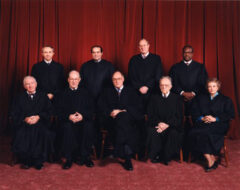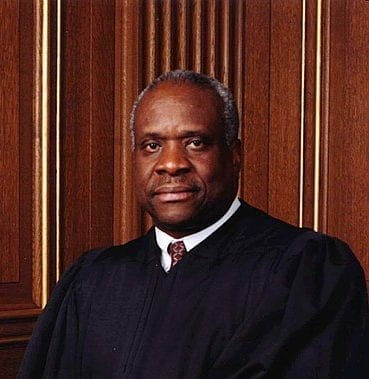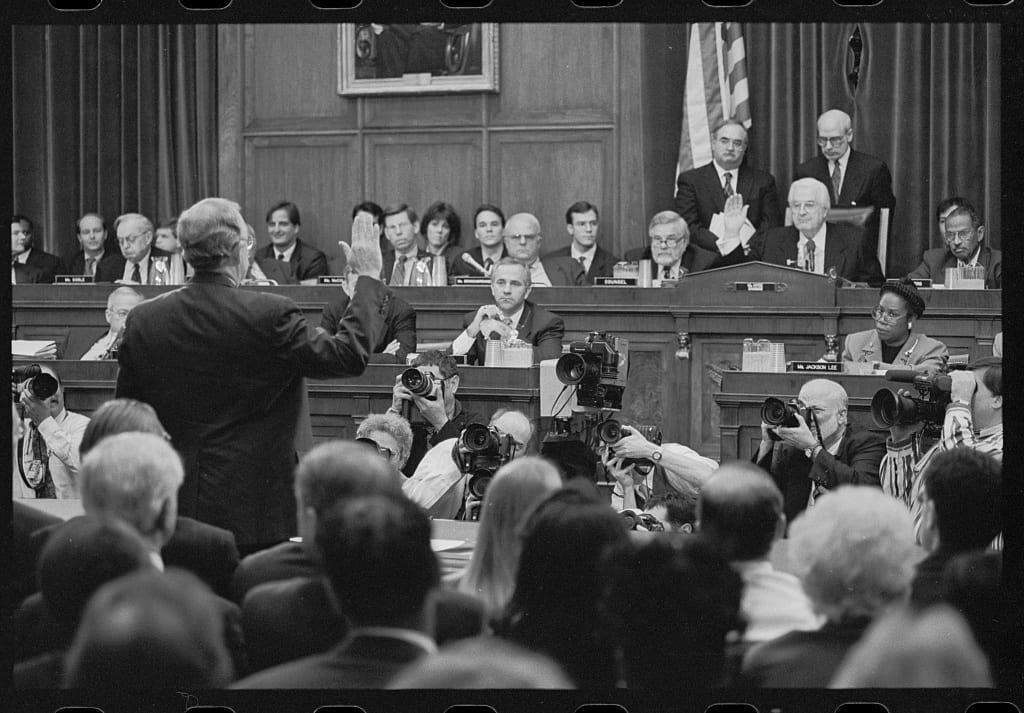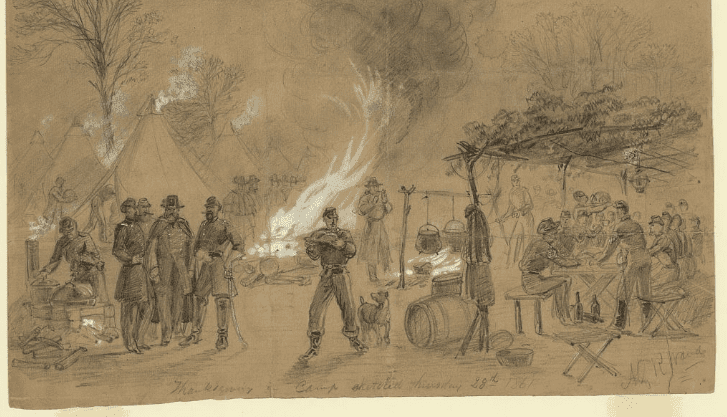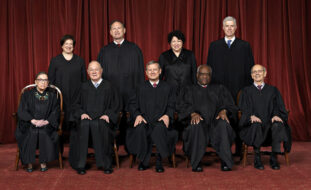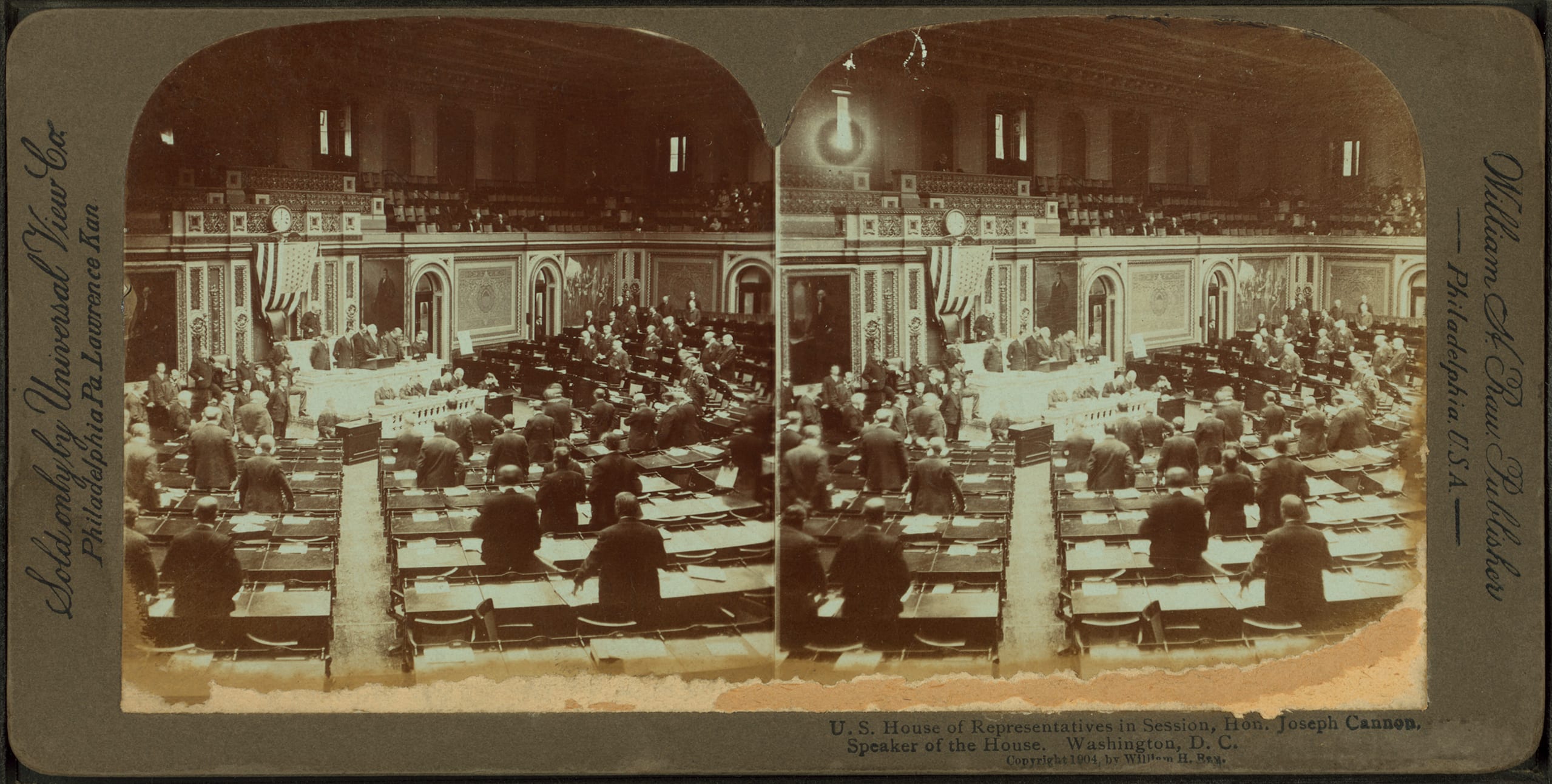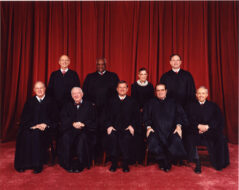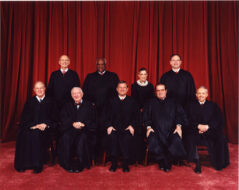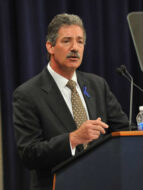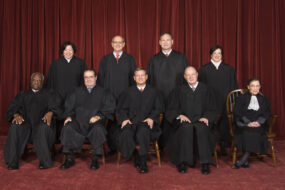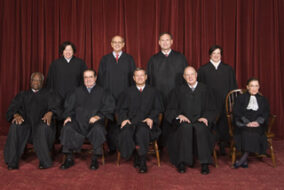
No related resources
Introduction
The Contract with America was a document released for the 1994 mid-term elections by the Republican Party explaining what the party would do if it won control of Congress. The contract borrowed from a State of the Union address given by Ronald Reagan years earlier. Additional input was provided by the Heritage Foundation, a conservative think tank that dealt primarily with public policy issues and had been working on many of the contract’s proposals for several years.
Introduced a month and a half before the election and approved by all but two of the Republican members of the House, the contract proved popular with the public, even though many people were unfamiliar with its details. Elections on November 8 gave Republicans control of both houses of Congress, as they gained fifty-four seats in the House and nine in the Senate. For the first time since Reconstruction, Republicans won more House seats in the South than Democrats. The Contract with America was not solely responsible for the Republicans’ success, but it did receive much credit, perhaps more than it deserved, from Republican Party leaders and others. Many provisions of the contract became law, sometimes after vetoes and negotiations with President Clinton. One effect of the Republican election victory was to move Clinton, already a moderate Democrat, more toward Republican positions, at least rhetorically. In his 1996 State of the Union address, Clinton announced that “the era of big government is over.”
The Contract with America had significance beyond Republican gains in the mid-1990s and the implementation of conservative policies. It was a major step in nationalizing House elections and making them hinge on partisan identity rather than local issues or interests. At the same time, the changes in House procedure the contract proposed aimed to put party leaders back in control of Congress and weaken the power of committees. These changes, however, did not reverse the eclipse of party and senior leadership control in American politics (See Mandate for Reform, and The Rainbow Coalition Speech to Democratic National Convention) and in the House that were inaugurated by the liberal Democrats who took seats in the 1974 (post-Watergate) mid-term election. The overall result of these changes stretching back decades and even beyond the early 1970s into the Progressive era (See The New Nationalism, and What Is Progress?) was a nationalized politics marked by sharp partisan differences.
Source: Republican Contract with America, September 27, 1994. https://web.archive.org/web/19990427174200/http://www.house.gov/house/Contract/CONTRACT.html.
As Republican members of the House of Representatives and as citizens seeking to join that body we propose not just to change its policies, but even more important, to restore the bonds of trust between the people and their elected representatives.
That is why, in this era of official evasion and posturing, we offer instead a detailed agenda for national renewal, a written commitment with no fine print.1
This year’s election offers the chance, after four decades of one-party control, to bring to the House a new majority that will transform the way Congress works. That historic change would be the end of government that is too big, too intrusive, and too easy with the public’s money. It can be the beginning of a Congress that respects the values and shares the faith of the American family.
Like Lincoln, our first Republican president, we intend to act “with firmness in the right, as God gives us to see the right.”2 To restore accountability to Congress. To end its cycle of scandal and disgrace.3 To make us all proud again of the way free people govern themselves.
On the first day of the 104th Congress, the new Republican majority will immediately pass the following major reforms, aimed at restoring the faith and trust of the American people in their government:
- FIRST, require all laws that apply to the rest of the country also
apply equally to the Congress; - SECOND, select a major, independent auditing firm to conduct a comprehensive audit of Congress for waste, fraud, or abuse;
- THIRD, cut the number of House committees, and cut committee staff by one-third;
- FOURTH, limit the terms of all committee chairs;
- FIFTH, ban the casting of proxy votes in committee;4
- SIXTH, require committee meetings to be open to the public;
- SEVENTH, require a three-fifths majority vote to pass a tax increase;
- EIGHTH, guarantee an honest accounting of our federal budget by implementing zero base-line budgeting.5
Thereafter, within the first one hundred days of the 104th Congress, we shall bring to the House floor the following bills, each to be given full and open debate, each to be given a clear and fair vote and each to be immediately available this day for public inspection and scrutiny.
- The Fiscal Responsibility Act: A balanced budget/tax limitation amendment and a legislative line-item6 veto to restore fiscal responsibility to an out-of-control Congress, requiring them to live under the same budget constraints as families and businesses.
- The Taking Back Our Streets Act: An anticrime package including stronger truth-in-sentencing,7 “good faith” exclusionary rule exemptions,8 effective death penalty provisions, and cuts in social spending from this summer’s “crime” bill to fund prison construction and additional law enforcement to keep people secure in their neighborhoods and kids safe in their schools.
- The Personal Responsibility Act: Discourage illegitimacy and teen pregnancy by prohibiting welfare to minor mothers and denying increased AFDC [Aid to Families with Dependent Children] for additional children while on welfare, cut spending for welfare programs, and enact a tough two-years-and out provision with work requirements to promote individual responsibility.
- The Family Reinforcement Act: Child support enforcement, tax incentives for adoption, strengthening rights of parents in their children’s education, stronger child pornography laws, and an elderly dependent care tax credit to reinforce the central role of families in American society.
- The American Dream Restoration Act: A $500 per child tax credit, begin repeal of the marriage tax penalty,9 and creation of American Dream Savings Accounts to provide middle-class tax relief.
- The National Security Restoration Act: No U.S. troops under UN command and restoration of the essential parts of our national security funding to strengthen our national defense and maintain our credibility around the world.
- The Senior Citizens Fairness Act: Raise the Social Security earnings limit which currently forces seniors out of the workforce, repeal the 1993 tax hikes on Social Security benefits and provide tax incentives for private long-term care insurance to let older Americans keep more of what they have earned over the years.
- The Job Creation and Wage Enhancement Act: Small business incentives, capital gains cut and indexation, neutral cost recovery, risk assessment/cost-benefit analysis, strengthening the Regulatory Flexibility Act and unfunded mandate reform to create jobs and raise worker wages.10
- The Common Sense Legal Reform Act: “Loser pays” laws,11 reasonable limits on punitive damages, and reform of product liability laws to stem the endless tide of litigation.
- The Citizen Legislature Act: A first-ever vote on term limits to replace career politicians with citizen legislators.
Further, we will instruct the House Budget Committee to report to the floor and we will work to enact additional budget savings, beyond the budget cuts specifically included in the legislation described above, to ensure that the federal budget deficit will be less than it would have been without the enactment of these bills.
Respecting the judgment of our fellow citizens as we seek their mandate for reform, we hereby pledge our names to this Contract with America.
- 1. It is worth noting, as evidence of the populist strain in American politics, that in his speech before the Progressive Party convention in 1912, Theodore Roosevelt referred to the party’s platform as “a contract with the people” and said that “if the people accept this contract by putting us in power, we shall hold ourselves under honorable obligation to fulfill every promise it contains.”
- 2. Abraham Lincoln, Second Inaugural Address.
- 3. The House Banking scandal broke in 1992. The House bank allowed members to overdraw their accounts without charges or penalties, a privilege their constituents did not enjoy.
- 4. Proxy voting allowed another member of the committee, usually the chair, to cast the vote of another member.
- 5. Base-line budgeting means building a new budget from the beginning every time one is required rather than beginning with an earlier fully developed budget.
- 6. A line-item veto would allow the president to veto specific spending measures in a bill rather than the whole bill.
- 7. Truth-in-sentencing would limit parole so that convicted felons served the term to which they were sentenced.
- 8. “Good faith” exclusionary rule exemptions allow evidence to be admitted during a trial, even if it was unlawfully obtained, as long as the evidence was gathered in good faith—that is without intent to violate the law.
- 9. An instance in which a married couple pays more income tax than they would have if they were single.
- 10. A series of measures to decrease the financial and regulatory burden on companies.
- 11. Anyone who brought a product liability suit to court and lost would pay the legal fees.
State of the Union Address (1995)
January 24, 1995
Conversation-based seminars for collegial PD, one-day and multi-day seminars, graduate credit seminars (MA degree), online and in-person.



















